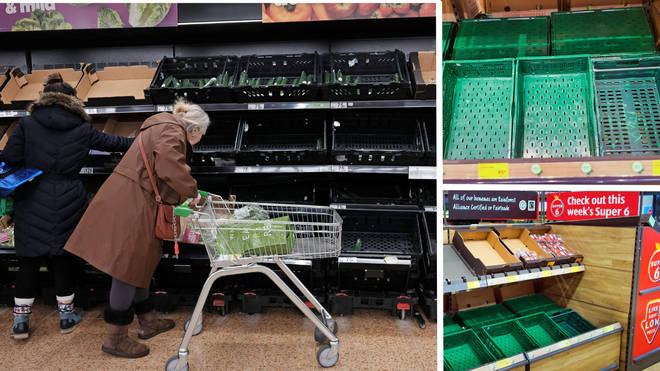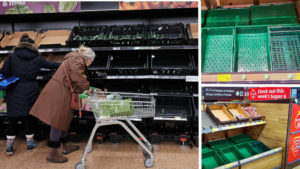Tesco and Aldi have become the latest supermarket chains to limit purchases of veg including tomatoes, peppers and cucumbers.
Customers will be allowed to buy a maximum of three packs at Aldi, the chain announced today.
This afternoon, Tesco became the fourth major supermarket to impose rationing, with limits of three per customer on sales of tomatoes, peppers and cucumbers.
Asda and Morrisons have already introduced caps on a range of fruits and vegetables.
Asda has limited shoppers to three items each on eight fresh produce lines – including broccoli, cauliflower, raspberries and lettuces.
Morrisons is putting limits of two per item on packs of tomatoes, cucumbers, lettuce and peppers from Wednesday.
Sainsbury’s, Lidl, Waitrose and M&S have not announced any limits.
The need for rationing comes because of shortages caused by poor harvests in Spain and north Africa but compounded by the effects of Brexit.
The former CEO of Sainsbury’s told LBC earlier today that supermarkets in the UK have been ‘hurt horribly by Brexit’.
Asda and Morrisons have both rationed tomatoes, cucumbers and lettuce, with the former citing “sourcing challenges on some products that are grown in southern Spain and North Africa”.
While former Sainsbury’s CEO Justin King acknowledged supply has been affected by poor weather abroad, he also said the sector had been “hurt horribly by Brexit“.
Mr King told Nick Ferrari at Breakfast on LBC that UK greenhouses, previously known to grow tomatoes, have suffered in recent years.
“These are products that we do produce, or in the past have produced year round in the UK,” Mr King said.
He continued: “North Kent, in Thanet, [had] the largest greenhouses in Europe, which used to be full of peppers, cucumbers and tomatoes.
“But those greenhouses have suffered, really, from two big things. I hate to say it, Nick, but it’s a sector that’s been hurt horribly by Brexit.”
He added that the supermarket industry had also suffered from the government’s decision to exclude it from its energy support scheme.
Andrew Opie, director of food and sustainability at the British Retail Consortium said: “Difficult weather conditions in the south of Europe and northern Africa have disrupted harvest for some fruit and vegetables.
“While disruption is expected to last a few weeks, supermarkets are adept at managing supply chain issues and are working with farmers to ensure that customers are able to access a wide range of fresh produce.”
Growers and suppliers in Morocco have had to contend with cold temperatures, heavy rain, flooding and cancelled ferries over the past three to four weeks.
Production problems in Morocco began in January with unusually cold night-time temperatures that affected tomato ripening.
Shoppers across the country have taken to social media to point out the lack of fruit and veg at their local stores, with several instead blaming Brexit.
One person highlighted the lack of food in a “leave-voting area” while another said “Brexit sucks”.
UK importers have become increasingly reliant on Morocco due to Brexit, which has affected with other tomato-producing European nations.
Spain remains a primary source of tomatoes for the UK, which has also been affected by colder weather in recent weeks.
Staff put up a sign apologising for the disruption in one Morrisons store.
“Availability across our tomato range has been significantly impacted by adverse weather conditions across Spain and Morocco,” it read.
“The current shortage is likely to improve within a couple of weeks.”
But one Twitter user, Mark Davyd, said: “I don’t know who dreamt up the ‘food shortages in England are caused by bad weather in Europe’ nonsense but to be completely clear; we don’t have any food shortages in Europe.
“The shelves are heaving with fresh fruit and veg.”
But some twitter users including Simply Red frontman Mick Hucknall encouraged followers from across the EU to post pictures of fully stocked shelves.
Head of the National Farmers’ Union Minette Batters said more limits could be introduced across stores as farmers struggle to meet the rising energy costs.
We are going into “uncertain times”, Ms Batters said.
She continued: “Everybody wants to avoid rationing, effectively, which is what we saw with eggs in December.
“But I think there are going to be challenges on availability of some food items.”
Andrew Opie, director of food and sustainability at the British Retail Consortium, said: “Difficult weather conditions in the south of Europe and northern Africa have disrupted harvest for some fruit and vegetables including tomatoes.
“However, supermarkets are adept at managing supply chain issues and are working with farmers to ensure that customers are able to access a wide range of fresh produce.”
Shadow Environment Secretary Jim McMahon, who will speak at the National Farmers’ Union (NFU) conference on Tuesday, said farmers were becoming increasingly “frustrated” with the situation.
“You’ve got farmers who feel so frustrated that they haven’t got government support and if you’re a consumer you’re going into the supermarket and seeing that shelves are empty,” he told Sky.
“Why? Because the government are not on the side of farmers or on the side of food security, and in the end, consumers are paying the price.
“We do grow produce here but it’s a matter of fact that we’re not growing tomatoes for instance because the cost of energy in the greenhouses is so high that they’ve just been turned off, that is a contributing factor to why there are gaps on the supermarket shelves.”
By Asher McShane@ashermcs







